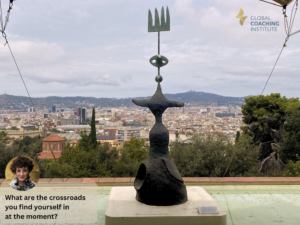Excellence in every profession is based on two things: skills and metaskills. Coaching is no different.
Skills are capabilities you need to perform your role. Without them you wouldn’t last long. Core coaching skills are things like:
-
deep listening
-
focused questioning
-
giving feedback
Having a strong mastery of these coaching skills is crucial. However, they are not necessarily the most important element when it comes to establishing the coach-client relationship. A client’s decision to work with a person often comes down to something more elusive – their metaskills.
Meta-skills are the unique attitudinal and feeling qualities that a coach brings to their practice.
Not WHAT but HOW
Let’s think for a moment about your ability to ask challenging questions. As coaches, we ask powerful and penetrating questions that bring people face to face with their deepest truth. This can be tough for clients! How do we earn the right to approach these undiscussables? The answer often lies in our metaskills.
Metaskills are high order skills that are essential to work effectively with clients. Amy Mindell writes extensively about metaskills as the feeling attitudes, which permeate the way we work with our clients and enable us to build rapport. Metaskills are felt – both within the coach and within the client.
A coach’s well-developed metaskills ensure a safe and constructive experience for their client, even when they find themselves stretched and challenged. The use of some metaskills, such as warmth, non-judgment and commitment to the learning journey can make tensions more tolerable.
Your Signature Metaskills
Your metaskills will reflect your personal attributes and are part of your unique style. Some coaches are known for a particular style and engaged because their metaskills are needed for specific situations and clients.
There are many, many coaching metaskills. Some define the coaching profession.
1. Not Knowing
Coaches work with individuals in fields where we are not content experts. Because of this, we need to remember that it is fine not to know. Hold that perspective that the client knows their world and circumstances better than we might ever hope to. Your goal is to partner with them effectively and bring out their wisdom. Therefore, your ability to sit comfortably in not-knowing is essential in order to avoid imposing yourself and getting in the way of the client’s learning and growth.
2. Curiosity
Coaches seek out the unknown and undiscovered elements of a situation. We are there to facilitate new insights with our client, so it’s important that we bring a spirit of curiosity to our work.
This means being curious about everything. Not only curious about the unknown and undiscovered aspects, but curious about the entire situation – even those parts that lie within clear view and may be taken for granted by the client! It is your curiosity that facilitates new insights and fresh explorations to what may be overlooked by the client. This includes illuminating habits, thinking patterns, stakeholder influences and much, much, more.
3. Wonder
Having a sense of wonder goes a step further than curiosity. Wonder is based on an inherent trust in what is unfolding. It is a kind of faith that has the potential to shift a client’s relationship to the issue at hand. Holding a metaskill of wonder can deepen your client’s sense of purpose and their commitment to staying the course.
4. Appreciation
There is a growing interest in strengths-based psychology and the power of recognising and appreciating What Is. Individuals usually know much more about their weaknesses than their strengths. Without being seen for what they ARE doing and the struggles they face, clients can plunge into self-doubt. When you show your appreciation, it helps the client understand their own talents and inner-resources. This enables them to become more mobilized. As a coach you can actively appreciate the client’s courage in seeking coaching, their strength to pursue their vision and their effort in grappling with challenging growth moments.
5. Detachment
A coach must be present to, but sit outside their clients’ view of themselves, their world and their specific situation. In order to facilitate meaningful insights and breakthroughs on perennial problems, you must see beyond your client’s fears.
6. Boldness
It requires a little boldness to ask the kind of powerful coaching questions that challenge a client’s identity or world view. Whilst you must seek rapport with your clients, you are also there in service of their growth and the attainment of their coaching goals. Your ability to ask bold and penetrating questions can model the confidence and courage that the client may need to expand their repertoire and attain their goals.
7. Humour
Having a sense of humour and bringing a quality of lightness to tough coaching moments, can shift the mood clients are confronting difficult decisions or being excessively hard on themselves. Humour is a powerful way to gain a little perspective when you and your client are under pressure. Practically, humour creates a space where everyone can think more clearly.
8. Creativity
Creativity is central to innovation. Being connected to your own creativity helps your clients to unleash theirs. It supports them to think outside the square and generate novel options.
Tailoring Your Metaskills
In our Coaching Untapped Potential program, we support students to recognise the precise metaskills called for in diverse coaching scenarios and to develop a repertoire of approaches matched to each situation.
Initially coaches report consciously thinking about what metaskills are needed, however with practice they intuitively moderate their metaskills to reflect each client’s emergent needs.
What are the coaching metaskills that you bring to your practice? How might you learn to recognise them and use them even more consciously?





